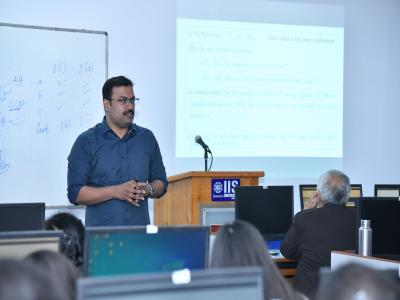NATIONAL WORKSHOP ON TIME SERIES ANALYSIS THROUGH EVIEWS 19-25 DECEMBER 2022

NATIONAL WORKSHOP ON TIME SERIES ANALYSIS THROUGH EVIEWS
19-25 DECEMBER 2022
A Report
The Department of Economics in collaboration with Centre for Research, Innovation and Training (CRIT), IIS (deemed to be University) organized a seven day ‘NATIONAL WORKSHOP ON TIME SERIES ANALYSIS THROUGH EVIEWS’ from 19-25 December 2022. The resource person of the workshop was Prof. Gnanendra M, Assistant Professor at CHRIST (Deemed to be) university, Bengaluru.
The very first of the workshop revolved around making the participants aware about the scope and subject matter of econometrics. The resource person explained the basic difference among time series data, cross sectional data and panel data The basic methodology of Econometrics was highlighted next under which the steps to be followed in Econometric modelling were explained. Sir proceeded further by establishing the concept of Hypothesis testing. The detailed interpretation of the results such as R Square, Adjusted R Square, TSS, ESS, RSS, Error term was explained with help of a dataset using EViews. The application of EViews in detection of heteroscedasticity, autocorrelation, multicollinearity and normality test for residuals in the data was also elaborated.
The major topics discussed during the second day involved- Introduction to regression models, Introduction to AR, MA, ARMA and ARIMA, Normality test, Stationarity or Non- Stationarity Process and conditions and Box-Jenkins methodology using EViews. He started with explaining the assumption of time- series data is that it should be stationary and taught the procedure via which it can be tested in the EViews. Later in the day, the session focussed on Box Jenkins methodology. Dr. Gnanendra patiently explained and cleared all the doubts that were raised.
The major topics covered in the day 3 of the workshop includes: ARCH Model, GARCH Model, T GARCH Model, E GARCH Model and GARCH M Model. He further continued the session by briefing the students about the issues that occur while calculating variance by OLS estimation methods and then introduced ARCH and GARCH Models for univariate analysis.
Then we moved to software work with data sheet provided by them. We set the null hypothesis and alternative hypothesis and worked on it while working on the systems, the concept and use of model was easy to understand for the attendees. This was followed by a doubt clearing session.
The fourth day of the workshop began with discussing the problem of GARCH Model, which is that it takes into account its volatility of past times. Further, DCC Model was explained in detail. Prof. Gnanendra further continued the session with explanation of the BEKK (Baba-Engel-Kraft-Kroner) model. After the end of the session, everyone was able to operate the R software efficiently.
Gnanendra started the first session of day 5 at 10:00 A.M. by discussing the Multivariate Models which includes Long run models (Engle granger cointegration test, Johansen and Julius cointegration test, Auto regressive distributed model(ARDL)) and short run models (Granger causality test, Impulse response, variance decomposition). He enlightened the problem of non-stationarity in the time series data. He introduced the concept of Cointegration – a long run model to study the long run association between the variables. He explained the steps to carry out the cointegration and showed on EViews. Firstly, Engle and Granger cointegration test was explained and its limitations were also explained. Afterwards, theory behind the Johansen cointegration test was explained and performed on EViews.
He enlightened all the participants with the theoretical framework of the VECM and explained in detail the equations related to the VAR framework.
He solved the doubts of the participants and concluded the last session of the day.
Day- 6 started with the discussion of Auto regressive distributed model (ARDL). ARDL model specification was taught by taking example of a three-variable dataset. Then the model was estimated. After the lunch break, resource person started the discussion with the short run models. Granger Causality(GC) test was introduced to the participants. The procedure for Toda- Yamamoto Non-Causality test was discussed in detail and explained in EViews.
Impulse response function (IRF) and Variance Decomposition analysis were also introduced to the participants.
After a very effort-taking and informative six days of the workshop, for the seventh and the last day, all the participants were asked to submit an assignment. Under the assignment, the resource person, gave the participants to choose their own time-series dataset with a condition to have at least 50 minimum observations. Once the dataset is selected, the participants were asked to apply any of the analysis model taught during the day workshop. The results and the complete analysis report was asked to be submitted.
Prof. Gnanendra took participants’ doubts into consideration and patiently helped them in getting them cleared. With this the interactive and illuminating seven-day workshop on ‘TIME SERIES ANALYSIS THROUGH EVIEWS; came to its official end.

